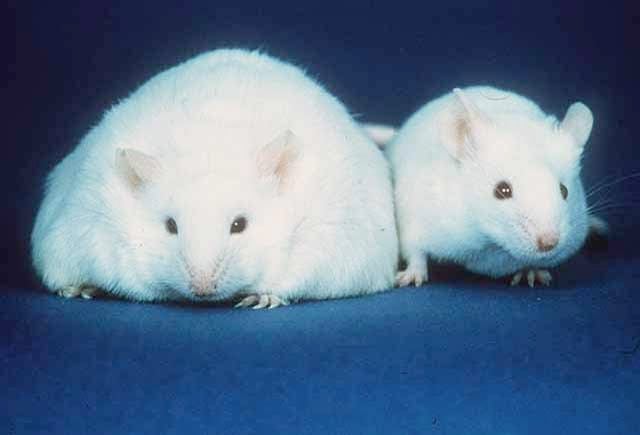
Obesity is a complex disease. It's not just an aesthetic problem because of having an excess amount of body fat. It is also a comprehensive medical problem because it increases the risk of heart disease, diabetes, high blood pressure, and certain types of cancer. In addition, obesity reconfigures the immune system.
Now, a new study conducted in the United States suggests that the effects of obesity can be so profound that it can even cause a drug intended to treat a common inflammatory disease to become a drug that make things worse.
It was observed that when mice with atopic dermatitis, which is a common type of allergic skin inflammation, are treated with drugs targeting the immune system, their thickened and irritated skin usually heals quickly. But if the same treatment is applied to obese mice, the skin worsens. This is because obesity modifies the molecular basis of allergic inflammation, both in mice and humans.
The new study is a collaboration between researchers at the Gladstone Institutes, the Salk Institute for Biological Studies and the University of California at San Francisco (UCSF). Their results, published in the journal Nature, shed light on how obesity can modify the immune system and, potentially, on how doctors could better treat allergies and asthma in people with obesity.

“We live in a time when the rate of obesity is increasing worldwide,” said Dr. Alex Marson, director of the Gladstone Institute of Genomic Immunology-UCSF and lead author of the study. “Changes in diet and body composition can affect the immune system, so we need to think about how diseases involving the immune system might differ between individuals,” he said.
America is the continent with the highest prevalence of overweight and obesity according to the World Health Organization, with 62.5% of adults overweight or obese (64.1% of men and 60.9% of women). If obesity alone is examined, it is estimated that it affects 28% of the adult population (26% of men and 31% of women).
The epidemic is no stranger to children and adolescents. In the 5-19 age group, 33.6% of children and adolescents are overweight or obese, and 7.3% of children under five years of age, according to the latest estimates by UNICEF, WHO and the World Bank.
Regarding the new study, Dr. Ronald Evans, lead author of the study, and director of the Salk Gene Expression Laboratory and the March of Dimes Chair in Molecular and Developmental Biology at Salk, said: “Our findings demonstrate how differences in our individual metabolic states can have great impact on inflammation, and how available drugs might be able to improve health outcomes.”
Earlier, a recent study had estimated that nearly half of U.S. adults will be classified as obese by 2030. Researchers also know that obesity, sometimes classified as a chronic inflammatory state, alters the immune system in multiple ways.

Doctors have reported that people with obesity often appear to have different courses of illness - from infections and allergies to cancer - and respond differently to some treatments.
During his postgraduate studies at Salk and his subsequent research in Marson's laboratory, Dr. Sagar Bapat - currently a pathologist and professor at UCSF - wanted to know, at the molecular level, how obesity affected atopic dermatitis. He found that when mice became obese through a high-fat diet before the induction of dermatitis, they developed a more serious disease than lean animals. To understand why, he and his colleagues analyzed the immune cells and molecules that were active in each group of mice.
“What we expected to see in obese mice was simply a higher degree of the same type of inflammation,” Bapat said. But that didn't happen. “We saw a completely different type of inflammation,” he said.
Helper T cells in the body, which help protect against infections but also become hyperactive in autoimmune diseases or allergies, can be grouped into three classes: they are TH1, TH2 and TH17 cells. Scientists had considered atopic dermatitis to be a TH2 disease. This means that TH2 cells are the ones that cause inflammation of the skin.

In thin mice with atopic dermatitis, Bapat and colleagues found that TH2 cells were active. However, in obese mice with the same condition, TH17 cells were activated. At the molecular level, this difference meant that atopic dermatitis was completely different in obese mice, and the question arose whether drugs that work in lean animals would also be effective in obese animals.
In recent years, scientists have developed drugs aimed at treating atopic dermatitis by buffering the response of TH2 cells. When Bapat and his colleagues treated obese mice with one of these drugs, not only did he not relieve their atopic dermatitis, but significantly worsened the disease.
“The treatment became a solid anti-treatment,” Bapat said. “This suggests that there may be identical twins who come to the hospital with the same disease, but if one is obese and one is thin, the same drug may not work in both,” he added.
Researchers suspected that dysfunction of a protein called PPAR-gamma might be mediating the link between obesity and inflammation. In 1995, Evans and his team discovered that PPAR-gamma was a master regulator of fat cells and a target of an approved drug for diabetes.
When scientists treated obese mice with atopic dermatitis with one of these PPAR-gamma-activating drugs, called rosiglitazone, the skin of the animals improved and the molecular profile of their disease changed again from TH17 to TH2 inflammation.
In addition, drugs aimed at TH2 inflammation were then, almost as in thin mice, able to improve atopic dermatitis in obese animals. “Essentially, we immunologically “disfat” obese mice without changing their body weight,” says Bapat.
The team also analyzed data from human patients with allergic diseases, including 59 patients with atopic dermatitis, as well as hundreds of people with asthma (another condition that similarly involves an immune system reaction) enrolled in a large existing longitudinal study. They found that obese people were more likely to have signs of TH17 inflammation or to lessen the signs of the expected TH2 inflammation.

Although more studies are needed in humans, data suggest that, in both humans and mice, obesity causes a change in inflammation that has consequences for the pathology of allergic disease and the efficacy of immunological therapies that target TH2-associated inflammation.
“What we would like to know more now is how exactly the T-cell change occurs,” admitted lead author Ye Zheng, associate professor at the NOMIS Center for Immunobiology and Microbial Pathogenesis in Salk. “Here are more details to be discovered that could be relevant to a number of allergy-related and asthma-related diseases,” he said.
However, the new study already points to the usefulness of combining therapy aimed at TH2 inflammation with a PPAR-gamma drug such as rosiglitazone to treat patients obese with atopic dermatitis.
“This is a case where our scientific discovery could have a very safe and rapid application to therapy in people,” Evans commented. “Our preclinical findings suggest that these drugs, already approved by the FDA, may have a unique co-treatment benefit in certain patients,” he stressed.
Consulted by Infobae, the university nutritionist and professor Rosa Labanca, from the Argentine Obesity Society, commented: “People with obesity have a change in immunity and this causes them to overreact to trivial situations. It is a condition with a strong pro-inflammatory impact: it exaggerates symptoms and promotes loss of quality of life and increased medical interventions. For example, allergic skin reactions, osteoarthritis or intestinal problems. There is like an immune dysregulation and this exacerbates the allergic symptoms in this case that are observed in the study.”
KEEP READING:
Últimas Noticias
Debanhi Escobar: they secured the motel where she was found lifeless in a cistern

The oldest person in the world died at the age of 119

Macabre find in CDMX: they left a body bagged and tied in a taxi
The eagles of America will face Manchester City in a duel of legends. Here are the details

Why is it good to bring dogs out to know the world when they are puppies



